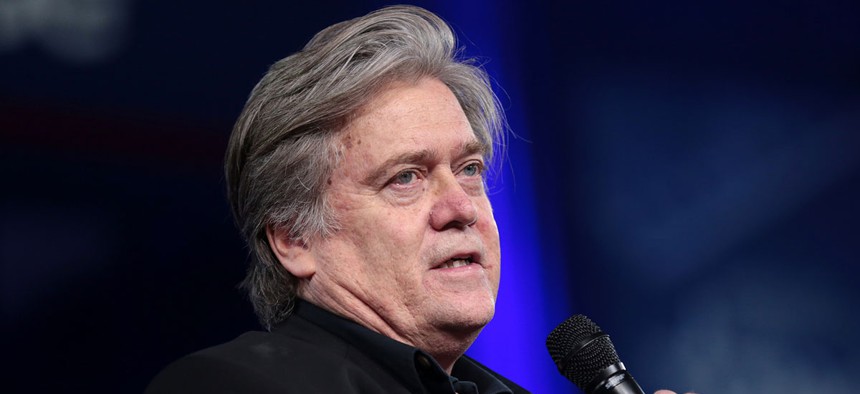
Flickr user Gage Skidmore
What to Make of Bannon's Exit From the NSC
The Trump administration is saying it was long-planned.
President Trump took office with an unconventional pick as National Security Adviser, and an unusual structure for his National Security Council. Now, both are gone.
White House chief strategist Steve Bannon’s removal from the principals’ committee of the National Security Council on Wednesday may signal a shift towards normalcy for the NSC, which spent much of the last few months mired in controversy.
Bloomberg News first reported the changes on Wednesday. Per a regulatory filing announcing the changes, the reorganization also includes the restoration of the chairman of the Joint Chiefs of Staff and the director of national intelligence as permanent members of the committee. Both permanent positions had been eliminated in January as part of a reorganization of the NSC shortly after Trump first took office.
Bannon’s placement on the NSC’s principals’ committee was an unorthodox move, as political advisors do not normally hold a permanent seat on the committee, which includes cabinet-level officials like the Secretaries of State and Defense. George W. Bush, for example, did not allow his top political adviser Karl Rove into NSC meetings. The controversy over Bannon’s role with the NSC reinforced Bannon’s public image as a kind of Svengali pulling the strings behind Trump. Bannon, whose most recent job before joining the campaign was as executive chairman of Breitbart News, leads the clique within the White House of nationalist ideologues whom I’ve referred to in the past as the “Breitbart wing.”
A senior White House official cast the move as not a demotion for Bannon, saying that Bannon was placed on the NSC to keep an eye on Mike Flynn, and to “de-operationalize” the NSC from former National Security Adviser Susan Rice, and that he never attended a meeting.
“Job done,” the source told me.
Another senior administration official said that Bannon had actually attended one meeting, over a month ago. The filing announcing the reorganization at the NSC, the official said, had been “imminent for a while.”
Republicans have accused Rice of being the source of a series of politically damaging leaks to the press for the Trump administration—including the one that led to the ousting of Flynn, her immediate successor. Rice has denied leaking national security information to the media.
The White House official said that Trump made the decision to remove Bannon and his exit from the NSC had been planned from the beginning of the administration. “We all knew Flynn had issues,” the source said.
Flynn’s issues were glaring enough that he only lasted as National Security Adviser for less than a month. He was asked to resign in February after revelations that he had misled Vice President Mike Pence about his contacts with the Russian ambassador. His tenure was the shortest of any national security adviser. Since his ouster, more damaging information has been revealed about him from prior to his becoming national security adviser, including that his company lobbied for the Turkish government during the campaign, without registering as a foreign agent as required by law.
The senior administration official told me that “certain people in senior staff started to get cold feet about Flynn during the transition,” including Bannon. During the transition, Flynn was the subject of a string of embarrassing media reports about his and his son’s pushing conspiracy theories on social media.
This White House has taken an unusual approach to internal bureaucracy, with alternative policy apparatuses within the building taking on duties traditionally performed by other agencies or structures like the NSC. Bannon has been involved with a group called the Strategic Initiatives Group, which was presented as a kind of internal think tank, while Trump’s son-in-law Jared Kushner is leading an Office of American Innovation described by the Washington Post as a “SWAT team to fix government.”
The move to downgrade Bannon’s role on the NSC could signal that more traditionally-minded forces are beginning to get their way in the White House. The move is an affirmation of the growing influence of National Security Adviser H.R. McMaster, who has also been filling the NSC with more established Republican foreign policy experts, according to the Washington Post.
Bannon told me last month that President Trump and General McMaster were "getting the NSC back to its proper role and function.”
(Image via Flickr user Gage Skidmore)
NEXT STORY: Analysis: The Silence of Rex Tillerson






